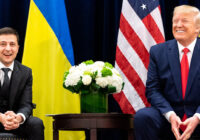Nearly three-quarters of the Ukrainian population may not share a common vision of the future, but they want politics at least to be entertaining. The Daily Devil’s Dictionary reports.
Before April 21, Volodymyr Zelenskiy was an actor, a television celebrity famous for portraying a school teacher who, against all odds, became president of the Ukraine. Zelenskiy has now become — presumably against all odds — thanks to his landslide victory in Sunday’s election, the new Ukrainian president.
Among the first heads of state to congratulate Zelenskiy were Donald Trump and Emmanuel Macron, who might have realistically told him: Welcome to our world of political hyperreality. They might also have added: It looks and sounds like fun, but be prepared for a few recurring headaches.
The media have begun predicting the difficulty Zelenskiy will have getting the rest of the political class to help him implement his program, while at the same time wondering whether he actually has a program. The Guardian makes this clear: “During the campaign, he offered little information about his policies or plans for the presidency, relying on viral videos, standup comedy gigs and jokes in place of traditional campaigning.”
Here is today’s 3D definition:
Campaigning:
Formerly an activity by political candidates focusing on the communication of their vision and plan for addressing recognized issues concerning the health of the economy and the society they hoped to have a role in governing. More recently, an activity in which candidates focus on creating the belief that, thanks to their unusual profile and personality, they are unafraid of conducting entertaining magic tricks that will both solve problems and implicitly humiliate those who propose traditional solutions.
Contextual note
With 73% of the vote in a non-rigged election against an incumbent, Zelenskiy has achieved something no leader in a modern democracy has ever done. Should we take it as proof of his abilities and political acumen (as yet unknown), proof of his vision (as yet unexpressed) or proof that democracy itself — to the extent that it still has meaning in our global geopolitical universe — is synonymous with hyperreality?
If Zelenskiy is like Trump in that he comes from the world of entertainment and clearly lacks a political brain, his opponent, the incumbent, was also like Trump in that he sold himself to the voters, back in 2014, as a billionaire who “promised Ukrainians they would ‘live in a new way’” if they elected him. They did (elect him) and didn’t (live in a new way), five years later.
Al Jazeera explains who Zelenskiy is for the Ukrainian public: “Over the last three years, he has been starring in a hit political TV sitcom, the Servant of the People, where he fights corruption as a teacher-turned-president.”
In most democracies, 73% of the vote should ensure a clear path for a new president to impose his or her policies. Zelenskiy faces the dual problem of not having any policies to push through and not having much, if any, support in a parliament made up of traditional parties that will remain in place until the parliamentary election in October.
Historical note
One of the characteristics of hyperreal politicians is that they appear — or seek to appear — as free spirits, from both established political traditions and the parties that convey and protect the policies enshrined in those traditions. Voters elect them precisely because of that perception.
Trump made a point card of not being part of Washington, DC, which he termed the “swamp.” He also hollowed out and took over the Republican Party like the Brazilian zombie-art fungus. “When the fungus infects a carpenter ant, it grows through the insect’s body, draining it of nutrients and hijacking its mind.” That is how Trump eliminated the frontrunner, Jeb Bush, predestined to lead the traditional Republican Party to victory, and then devoured the other 15 more or less traditional Republicans who opposed him.
In 2017, Emmanuel Macron achieved something similar in France, though his only link with the hyperreal world of entertainment was his youthful good looks, worthy of a “jeune premier” or leading man in a Hollywood movie. Even the dark and handsome, but more mature, François Fillon, representing the traditional right and widely expected to coast to victory, couldn’t beat him, though the reason had less to do with Macron’s charisma than with the corruption and nepotism scandals that were exposed during the campaign. The nation belatedly discovered that Macron, once elected, turned out to be singularly lacking in on-screen charisma, which not only contributed to the yellow vest revolt against the president himself, but has also poisoned his various attempts to calm things down.
On what to expect from Zelenskiy, Reuters cites Serhiy Fursa, an investment banker at Dragon Capital in Kiev: “Since there is complete uncertainty about the economic policy of the person who will become president, we simply don’t know what is going to happen and that worries the financial community.”
In some ways, the Ukraine election sums up the crisis of faith in democracy that seems to playing out across the globe. Journalist Carole Cadwalladr, in a hard-hitting TED Talk, concludes that since the “gods of Silicon Valley” — Facebook, Twitter and Google — have taken over the burden of disseminating and orientating political discourse, democracy in the sense we have traditionally understood it is no longer possible. She focuses on the perverse manipulation — not in the name of political argument or ideological conviction, but of pure profit — that influenced the outcome of the Brexit vote in 2016. But similar phenomena have distorted the outcomes of elections in the US, Italy, France and Ukraine, bearing out her conclusion.
Voters have no more to work with than their own easily manipulated emotions. In such a world, hyperreality looks like a solution. To a certain extent, this is what happened nearly 40 years ago in the post-Vietnam, post-Watergate United States, long before social media existed, when Hollywood mannequin Ronald Reagan won the presidential election. The effect has only grown in proportion and intensity. Politics has become not merely dependent on hyperreality, but is now its core representation.
*[In the age of Oscar Wilde and Mark Twain, another American wit, the journalist Ambrose Bierce, produced a series of satirical definitions of commonly used terms, throwing light on their hidden meanings in real discourse. Bierce eventually collected and published them as a book, The Devil’s Dictionary, in 1911. We have shamelessly appropriated his title in the interest of continuing his wholesome pedagogical effort to enlighten generations of readers of the news.]
The views expressed in this article are the author’s own and do not necessarily reflect Fair Observer’s editorial policy.
Support Fair Observer
We rely on your support for our independence, diversity and quality.
For more than 10 years, Fair Observer has been free, fair and independent. No billionaire owns us, no advertisers control us. We are a reader-supported nonprofit. Unlike many other publications, we keep our content free for readers regardless of where they live or whether they can afford to pay. We have no paywalls and no ads.
In the post-truth era of fake news, echo chambers and filter bubbles, we publish a plurality of perspectives from around the world. Anyone can publish with us, but everyone goes through a rigorous editorial process. So, you get fact-checked, well-reasoned content instead of noise.
We publish 3,000+ voices from 90+ countries. We also conduct education and training programs
on subjects ranging from digital media and journalism to writing and critical thinking. This
doesn’t come cheap. Servers, editors, trainers and web developers cost
money.
Please consider supporting us on a regular basis as a recurring donor or a
sustaining member.
Will you support FO’s journalism?
We rely on your support for our independence, diversity and quality.








Commenting Guidelines
Please read our commenting guidelines before commenting.
1. Be Respectful: Please be polite to the author. Avoid hostility. The whole point of Fair Observer is openness to different perspectives from perspectives from around the world.
2. Comment Thoughtfully: Please be relevant and constructive. We do not allow personal attacks, disinformation or trolling. We will remove hate speech or incitement.
3. Contribute Usefully: Add something of value — a point of view, an argument, a personal experience or a relevant link if you are citing statistics and key facts.
Please agree to the guidelines before proceeding.